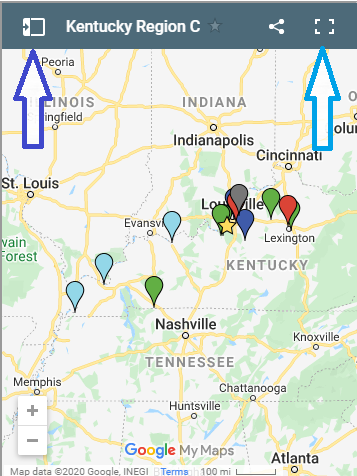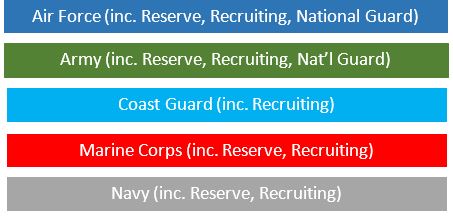The Congressionally Directed Medical Research Programs (CDMRPs) relies on medical consumers, their families, and caregivers to provide direction on which research is most likely to benefit people like themselves. Parent center staff and volunteers, military-connected family members and civilian family members may be eligible to join review panels that decide which research on their disease, injury or condition will get funding from Congress. According to previous participants, it’s an amazing way to help others in similar situations.
Continue reading “Help Decide the Course of Medical Research-Benefits for Your Center and Families You Serve”Category: Social Media
Frequently Asked Questions-Answers from the Branch
Many parent center staff, even those who often work with military-connected families, contact the Branch team with questions about how things work in the military system.
Here are some examples of questions we’ve received—you may have similar questions. While you are free to contact us, many answers can be found in the resources on our website, such as the resources listed below. You can also find answers by going to branchta.org and entering the topic in the search area.
K-12 and Post-Secondary
- “A military family I’m helping is having difficulty getting their child’s records transferred-who can they talk to?”
- “The new school is insisting the student take an alternate exit exam due to her disability, which will prevent her from getting a regular diploma. The family is active duty military—is there anything to help?”
“Military Families, Welcome to Our State”
State-specific information about a state’s education system is essential for relocating military families, along with how and why to contact a parent center. Parent Center staff developed this resource in collaboration with the Branch!
Continue reading ““Military Families, Welcome to Our State””Find Partners for Outreach to Veterans’ Families
In helping new veterans’ families navigate civilian services and systems, the Branch highlighted situations where parent centers can make a crucial difference. New veterans’ families are those whose service member has recently transitioned to civilian life. They may be new residents or have lived for years in your state but are now new to all its resources as civilians and parents of a child with a disability. These families may have always used military-provided supports and services and may not even know parent centers exist.
How will veterans’ families know about your parent center?
Continue reading “Find Partners for Outreach to Veterans’ Families”5 Top Branch Resources Used by Parent Centers
Have you used any of these five most-visited resources? Parent centers in states as diverse as Michigan and Texas use them to help military families–check them out for the families you serve!
Continue reading “5 Top Branch Resources Used by Parent Centers”3 Training Resources for Parent Centers: for staff and families
The Military Families Learning Network (MFLN)is a project of the Department of Defense (DoD) and the US Department of Agriculture through the Cooperative Extension Service.
For Parent Centers: These items were selected for their usefulness for your staff development and your coworkers and as parent resources.
A thought-provoking set of training exercises on establishing trust with military families or indeed any family or individual.
Continue reading “3 Training Resources for Parent Centers: for staff and families”Key Topics on the minds of military families
Feature your parent center’s information, training and resources on these topics to reach and assist military families:
- State-specific Information
- Moving and your child’s IEP
- Community resources at your new duty station
Highlighting these three key areas using language familiar to military-connected families (“PCSing”) demonstrates your parent center’s knowledge of the issues they face.
Continue reading “Key Topics on the minds of military families”2 Super-Easy Ways to Show Your Support for Military-Connected Families with Month of the Military Child
Month of the Military Child (MoMC) happens every April.
Your center’s visible celebration of MoMC encourages military families to come to you when they need help. They’ll know you have made efforts to learn about and understand their needs, their world, and the challenges their children face.
How?
- Customize and use the supplied graphics and content
- Share events happening during MoMC
Exceptional Family Member Program (EFMP)
The Exceptional Family Member Program (EFMP) is a mandatory* Department of Defense program that helps military dependents with special needs. The Coast Guard, which operates under the authority of the Department of Homeland Security has a similar program called the Special Needs Program, or SNP.
* EFMP is mandatory, primarily so a family member’s needs may be considered during the duty assignment process. However, some families do not enroll because they believe the program requirements are not worth the benefits to them, or they perceive the program as limiting the service member’s duty assignment options, and thus his or her career.
EFMP Family Support staff, along with an installation’s School Liaison, are the primary points of contact for parent centers for holding installation-based trainings, access to meet with families on installations, and insider information about installation support programs and family engagement.
Continue reading “Exceptional Family Member Program (EFMP)”Region A Military Installations and Contacts
The maps help you find military installations in your state, along with contact information for Exceptional Family Member Program (EFMP) Family Support or School Liaison Office (SLO) staff in each location. For Coast Guard and National Guard locations, we have contacts for the Special Needs Program (SNP) and the Family Assistance Coordinators, respectively. Contacts who support Recruiter families are also included
Scroll down to find the mini-map for your state.
- To open the map, click on the open square icon, which is in the upper right corner of each mini-map on this page.
- In the open map you can click on a colored icon for contact information, or use the side list. You can also drag the map along on this page by placing the cursor on the map and moving the cursor when it becomes a hand.
- For just the list of installations and contacts, click on the list icon at the top left of the mini-map. If it says something like “and 55 more”, click on that phrase to open the entire list.
- When the list opens, select the installation or contact you want; information opens in a new box.
- The map and list use Google Maps for you to get directions.

The map icons represent military locations and the yellow stars are Parent Centers. The key above the maps shows how the icons are color coded by branch. Air Force is dark blue, Army is green, Marine Corps is red, Coast Guard is light blue and the Navy is battleship gray.

Download map information as a Word docx.:
Connecticut Delaware District of Columbia Maine Maryland Massachusetts New Hampshire
New Jersey New York Pennsylvania Puerto Rico Rhode Island US Virgin Islands Vermont

